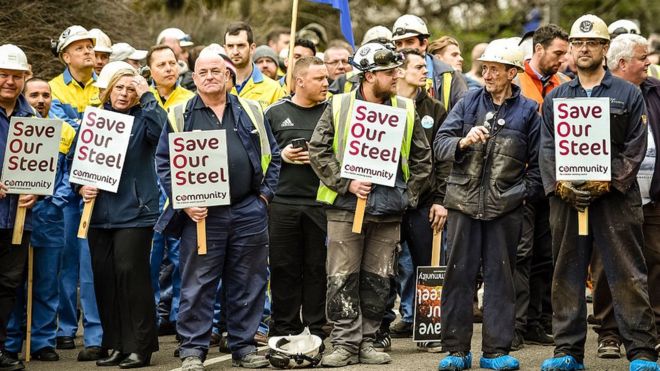Liberty House tycoon vows to revive British steel industry

Sanjeev Gupta underlines commitment to ‘Herculean task’ as metals group continues talks to rescue two Scottish mills
The metals tycoon Sanjeev Gupta has vowed to take on the “herculean task” of reviving British steel, as his Liberty House firm closes in on a deal to save two Scottish steel mills.
The global metals group is in talks to buy the Clydebridge and Dalzell steel mills in Lanarkshire from Tata Steel, which mothballed them last year as it hacked back its UK business.
A deal could be announced as early as Wednesday, with the Scottish government keen to see a resolution before it breaks up before the election for the nation’s parliament in May.
Sticking points are understood to include the amount of backing the government can offer under EU state aid rules and whether Liberty House would take on environmental liabilities immediately.
Gupta said while he was legally barred from discussing details of the talks, any deal would herald the start of a plan to build a sustainable steel sector in Britain.
“This is the beginning of the journey, not the end,” he told the Guardian. “To reform the UK steel industry, which is probably the worst in the world, is a herculean task. But I am betting on it. I’m dedicating myself 100% to it.”
He said Liberty House would continue to weigh up bids for steelworks and engineering businesses that could complement each other as part of a nationwide steel empire.
“Clearly we are an ambitious company. I’ve put myself in the centre of UK industry and I intend to stay here,” he said. “We are already looking at other plans and will look at possibilities upstream and downstream.”
Gupta’s blueprint is to convert old steelworks by installing furnaces capable of recycling scrap steel, rather than producing it from raw materials. He says the UK exports about 7m tonnes of scrap steel and imports a similar volume of goods that contain steel parts.
Liberty House bought an advanced engineering business in the Midlands from collapsed steel firm Caparo last year. And Gupta said steel firms could survive by funnelling recycled scrap steel to engineering firms such as these.
“We could have an entirely efficient industry that is sustainable in the long term. We don’t need to make any steel, we just need to recycle it. It’s not an easy road to follow but there is a way to do it and it needs to be done,” he said.
“This is an engineering nation, there’s a great deal of skill and infrastructure, so we can’t just rely on the service sector. We can at least make as much steel as is needed for our own consumption. There is nothing to stop this happening if there is a concerted effort.”
Gupta said Liberty House, which employs about 1,500 people in the UK, could increase its headcount to 5,000 with government support. He pointed to the firm’s Newport steelworks in south Wales, which it bought in 2013 and reopened last year.
Liberty House wants to convert the site by installing an electric air furnace capable of recycling scrap steel, a project it says could create 1,000 jobs in Newport. But Gupta said the government’s inaction on reducing energy prices and supporting renewable energy were hampering the firm’s efforts.
Liberty House’s sister company, Simec, supplies the Newport plant with energy from the nearby Uskmouth coal-fired power station. Gupta said power stations such as these should be exempt from levies on carbon dioxide emissions because they directly support heavy industry.
The alternative, said Gupta, was for scrap metal to be sent abroad, creating more CO2 emissions in the long run. He said the group would prefer to convert Uskmouth to run on greener biomass but government backing for coal-to-biomass conversions was under threat from EU state aid rules.
Gupta is also an investor in Tidal Lagoon, the project to build tidal power stations in Swansea Bay and around the coast, which he said could provide Newport with cleaner energy.
Some steel firms have blamed UK steelmakers’ woes on China dumping cheap steel on the EU, calling for greater tariff protection against such imports. But Gupta said this would not be necessary if the UK focuses on recycling steel. “I don’t think protectionism is the answer. We need to make it cheaper and more competitive, which can be done,” he said.
Gupta was speaking as unions expressed concerns that Tata Steel, which announced 1,200 job cuts last year, could shut the Port Talbot steelworks in south Wales. The company has put forward a turnaround plan that would see about 750 jobs go.
The steelworkers’ union Community said reports that Tata planned to close the site were “deeply concerning”.
“We are united in our determination to do all we can to ensure that Tata Steel maintains its commitment to steelmaking in Europe,” said Roy Rickhuss, general secretary of Community.
“We have a number of shared concerns about recent developments within the company, not least the fact that the CEO of Tata Steel Europe no longer sits on the board of Tata Steel in Mumbai.
“We will be working together to ensure that Tata Steel hears the concerns and recognises the commitment of its European employees to building a sustainable future for its European operations.”
Community also lashed out at the UK government, which it said was “at the forefront” of attempts to block changes to the EU’s lesser duty rule.
The proposals would make it easier for the trade bloc to impose punitive tariffs on Chinese firms flooding Europe with cheap steel due to a slump in domestic demand.